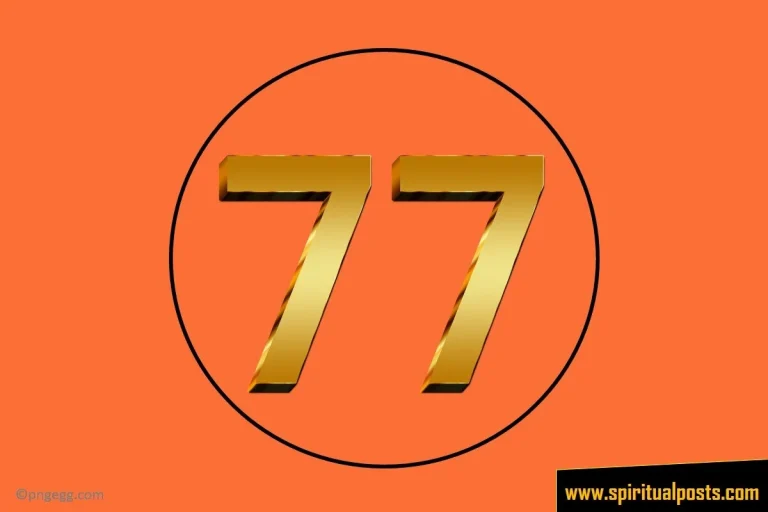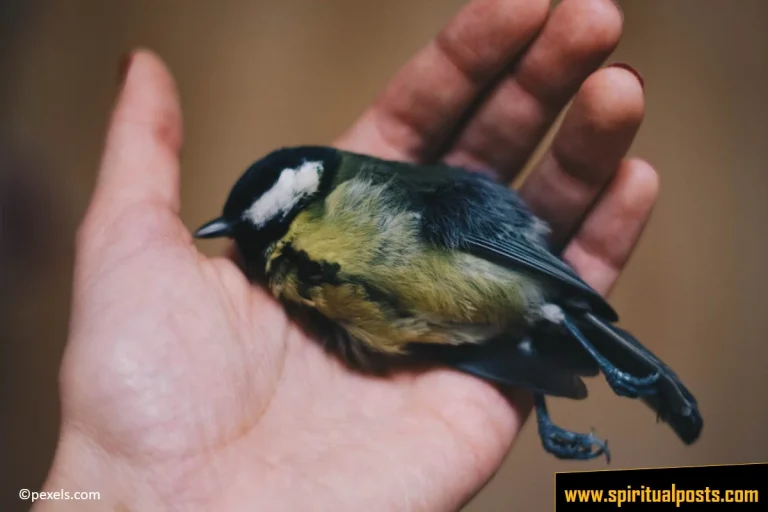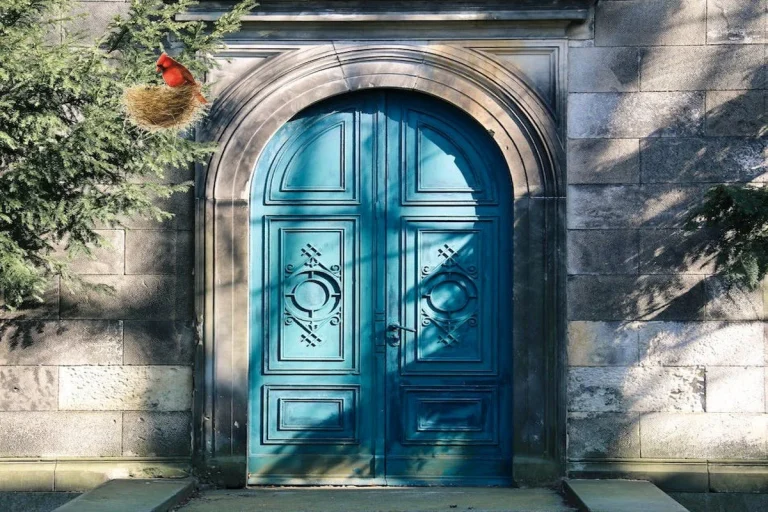10 Spiritual Meanings of a Dragon with Cultural Symbolism
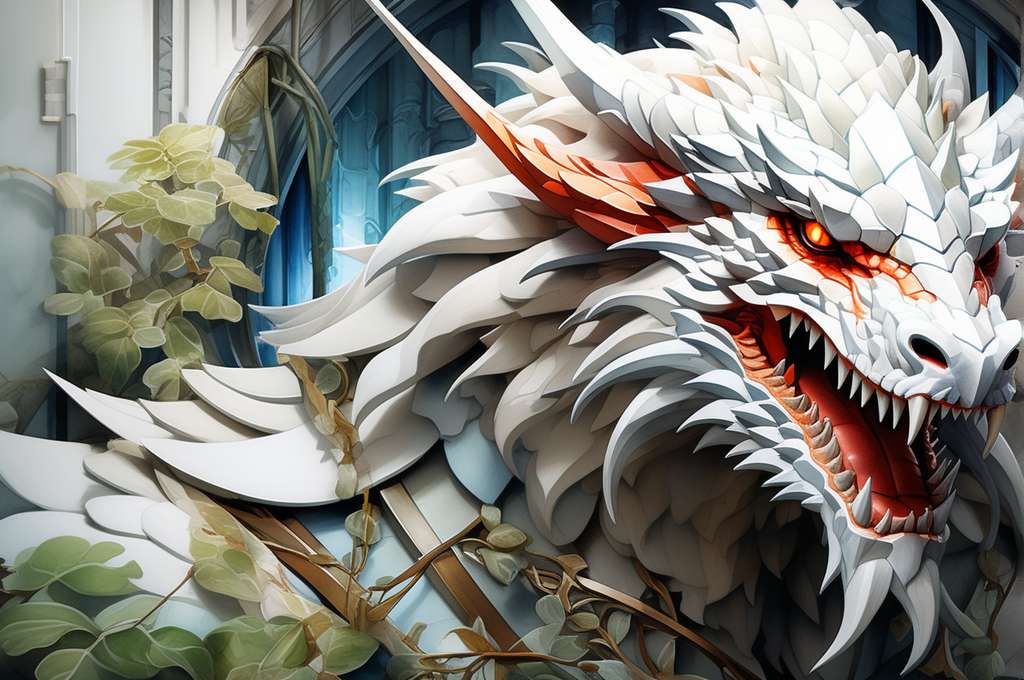
Dragons have captured the imagination of people for centuries, appearing in myths, legends, and folklore around the world. These majestic creatures are often associated with powerful symbolism and spiritual meanings.
In this blog, we’ll explore the fascinating spiritual significance of dragons, delving into their symbolism and the lessons they can teach us. Get ready to uncover the mystical world of dragons and the profound wisdom they hold.
As a symbol of strength, transformation, and the primal forces of nature, the dragon spirit animal serves as a guiding force in one’s personal and spiritual development, offering an array of symbolic meanings and attributes.
What does a dragon symbolize?
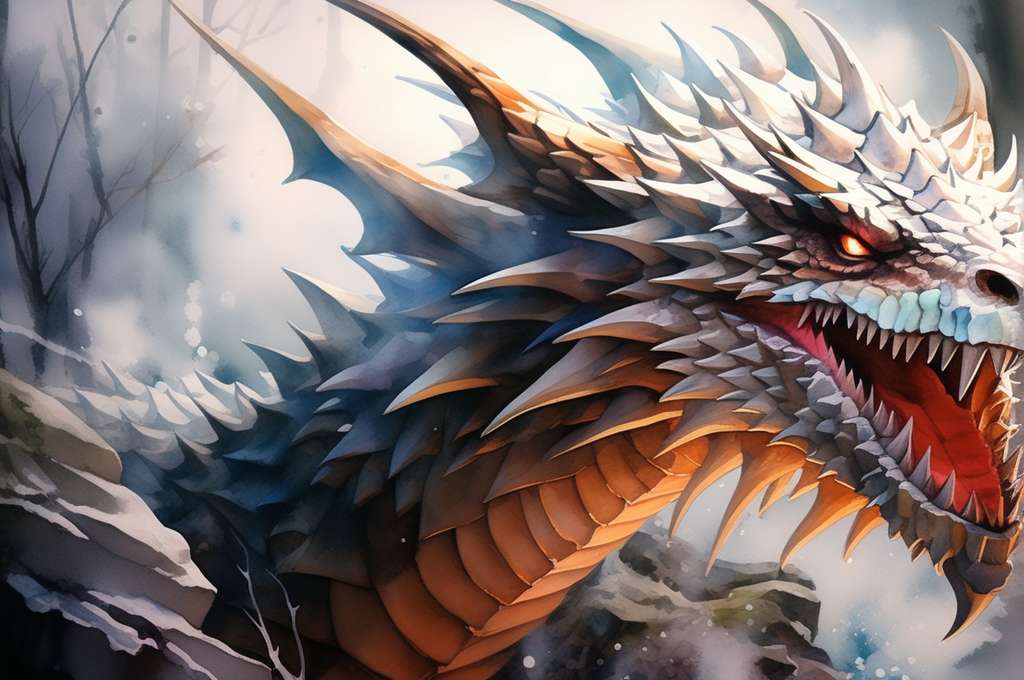
The dragon, a creature woven from myth and imagination, carries a wealth of symbolism that varies across cultures and through time. Its meaning, like its fiery breath, can be both dazzling and destructive, depending on the context.
In Eastern cultures, the dragon is often a revered figure, a symbol of power, wisdom, and good fortune. In China, it’s associated with the emperor, embodying his authority and control over the elements. The majestic Chinese dragon, serpentine and wise, brings rain and symbolizes prosperity.
Japanese dragons, meanwhile, are guardians of temples and spiritual protectors, often depicted with benevolent, almost human-like expressions.
However, the dragon’s fiery side takes hold in Western tales. Here, it represents chaos, greed, and primal danger. Think of the fearsome beasts guarding hoards of gold in European folktales, or the fire-breathing monsters slain by valiant knights. These dragons embody untamed nature, a force to be conquered by human courage and ingenuity.
But even in the West, the dragon’s image isn’t entirely negative. Celtic dragons, for example, are associated with water and the earth, symbols of change and transformation.
Norse dragons, like the fearsome Nidhogg, gnawing at the roots of the world tree Yggdrasil, represent the inevitable decay and rebirth inherent in the universe.
Positive spiritual meanings of a dragon
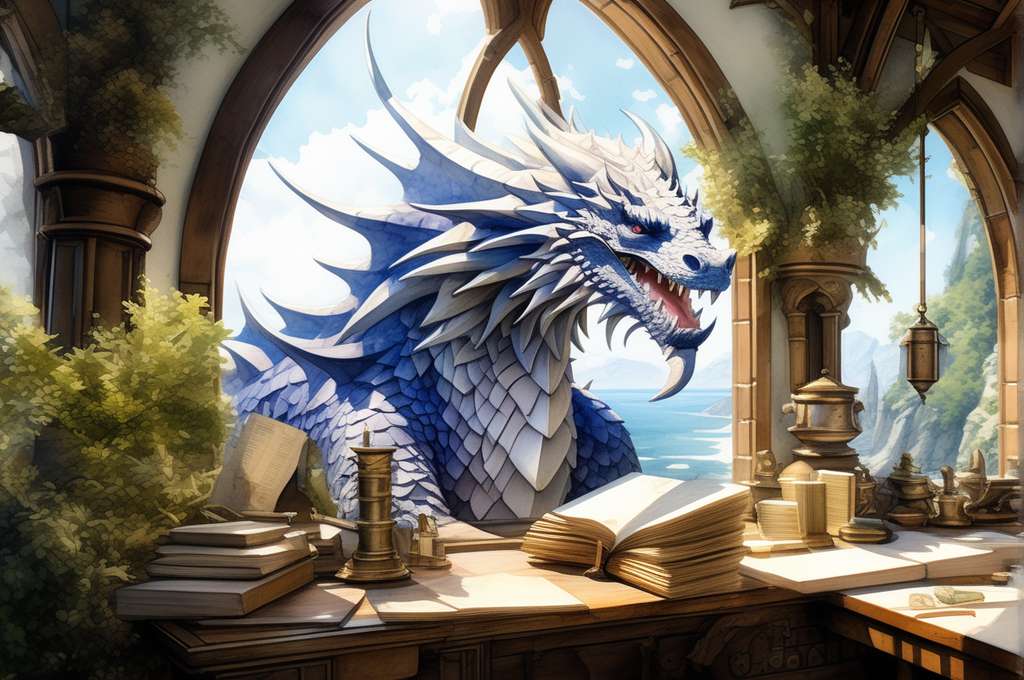
The dragon, often feared as a fiery beast, hides a wealth of positive spiritual meanings within its scales. Here are some potent ways dragons can symbolize your inner journey:
1) Wisdom
- Dragons live for thousands of years, accumulating vast stores of knowledge and experience over their long lives. This deep wisdom is valued by those who seek understanding.
- In many myths, dragons are keepers of cosmic secrets, primordial knowledge from the origins of the world. Their wisdom provides insight into the fundamental truths of existence.
- Representing the element of air, dragons have clarity of vision and see beyond surface illusions. Their celestial vantage point gives them perspective on the big picture.
- Interacting with a dragon through dreams or meditation can unlock intuitive wisdom from one’s inner depths.
2) Protection
- Many stories tell of dragons guarding sacred sites like temples, palaces, gardens or holy mountains. Their protective presence wards off enemies, demons, or dark forces.
- Dragon imagery, like guardians at an entrance, can symbolize protective energy watching over what is precious.
- Calling on the fierce yet benevolent power of dragons can aid in feeling shielded and safe.
- Dragon amulets and talismans keep harm at bay and surround bearers with invisible protective auras.
3) Power
- Dragons represent the primordial energy from which the universe was born. This ancient power goes beyond the mere physical into the realms of spirit and destiny.
- Riding or battling dragons in myths represents the hero’s quest to conquer fears, overcome challenges, and master his power within.
- Having a dragon as a spiritual ally empowers one with active energetic support in facing life’s tests.
- Dragon medicine helps integrate shadow and light to achieve wholeness of being and full actualization of potential.
4) Prosperity
- In Eastern cultures especially, dragons symbolize abundance. Their mythical gems, gold, and pearls represent material riches.
- But dragons can also signify prosperity of spirit – purpose, meaning, inner fulfillment beyond money.
- Dragons reveal where to uncover one’s hidden treasures, resources, and potential.
- With a dragon as a spiritual guide, the journey through life bears fruit, brings surprises, and remains full of magic.
5) Rebirth
- By shedding its skin, the dragon represents death and rebirth. Each time it transforms, it experiences renewal.
- Dragon medicine facilitates inner renewal, helping people release old ways of being and welcome in the new.
- For the soul, dragons represent eternal life, the spirit living on past physical death.
- Dragons remind us life is cyclical – always changing, always rebirthing in new colors and forms.
Negative spiritual meanings of a dragon
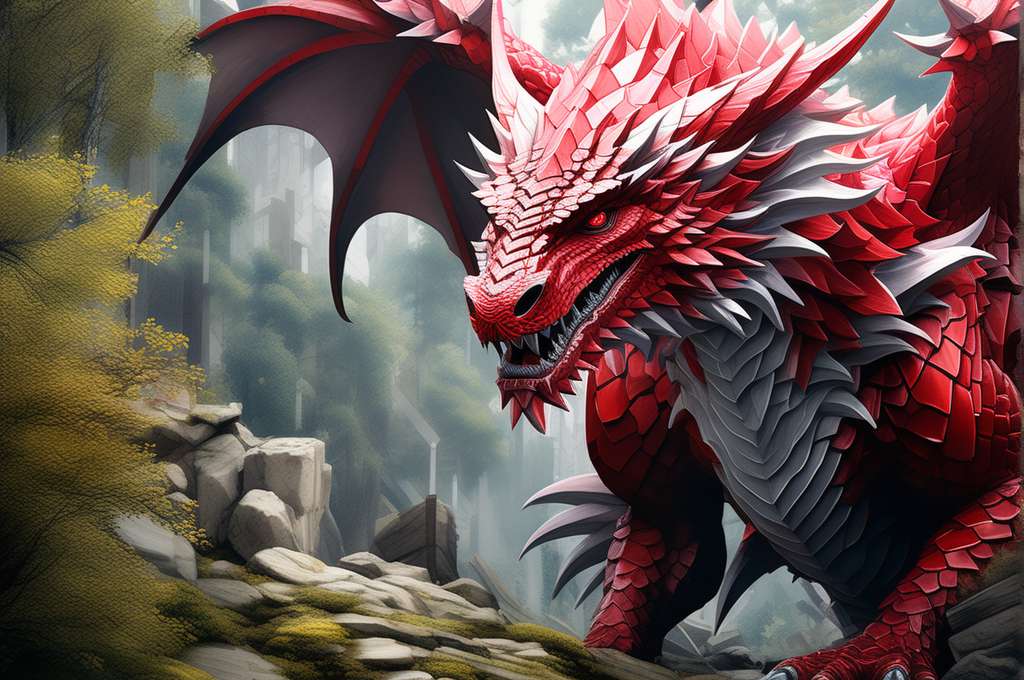
While many cultures view dragons as symbols of good fortune, wealth, and power, others associate them with negative traits.
1) False prophet
In the Book of Revelation, the dragon is explicitly identified as Satan. The dragon empowers the beast from the sea, which represents powerful evil governments. This beast receives authority from the dragon and makes people worship the beast from the earth, the false prophet. The false prophet deceives people into worshipping the first beast. The dragon, as Satan, enables deception by providing power to the two evil beasts.
2) Arrogance
The dragon’s supernatural abilities, such as flying and breathing fire, can inflate the ego with feelings of invincibility. Hoarding treasure in isolation can lead to possessiveness and greed. As a predator, the dragon lacks compassion for other beings, instead displaying aggression, jealousy, and rage. Unchecked, the mighty dragon mentality leads to viewing others as inferior and lashing out from a place of arrogance.
3) Chaos and evil
Dragon imagery of thrashing, coiling, and devouring portray an untamed beast bringing turbulence and ruin. They disrupt social order and stability, thriving in lawless realms of wilderness. In medieval faith, the dragon was the devil beast beyond God’s light, associated with sin, damnation, and moral corruption. Its presence spreads pandemonium and wickedness.
4) Overconfidence
The dragon’s formidable strengths, like ferocity, cunning, longevity, and sorcery, imbue those connected to it with self-assurance. However, overconfidence from inflamed dragon energy can morph into audacity, foolhardiness, conceit, and lack of grounding. Staying humble, thoughtful, and realistic helps balance dragon pride.
5) Fear and danger
As a lethal predator and volatile beast, the dragon encapsulates primal fears of destruction and death. Fiery breath, razor claws, crushing coils, and homicidal rampages reinforce the terror of dragons. Myths of dragons burning villages, killing maidens, ruining landscapes, and battling valiant knights establish them as objects of awe, alarm, and horror.
Native American symbolism and spiritual meanings of a dragon
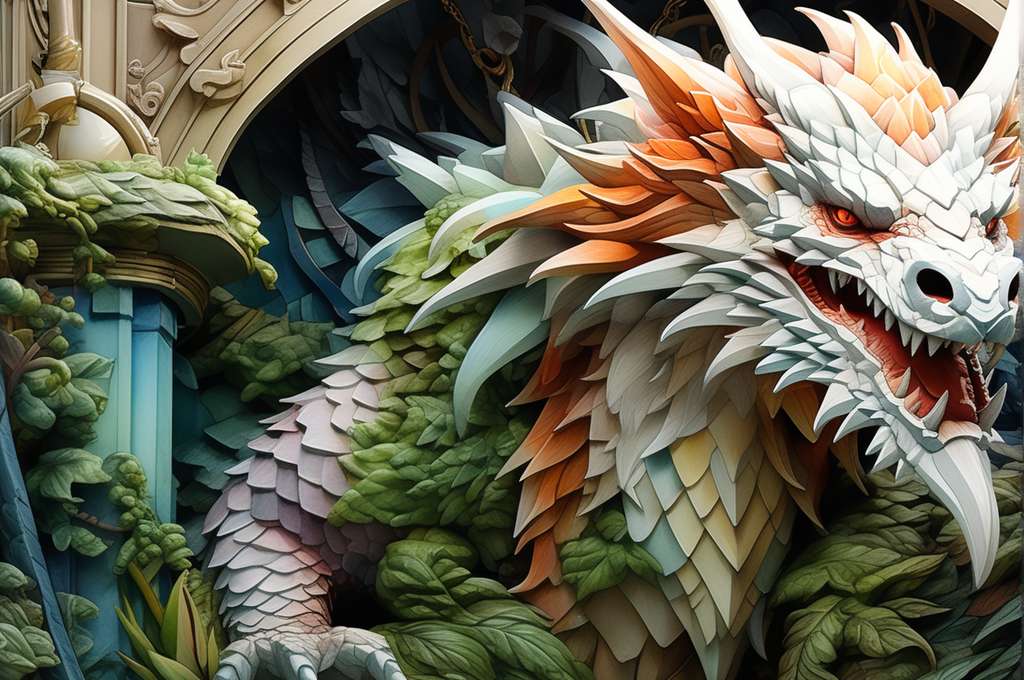
Unlike in European or Asian cultures, dragons as we know them are not prevalent in traditional Native American mythologies. While some tribes have serpent-like creatures in their legends, these wouldn’t typically be classified as “dragons” in the Western sense, lacking wings, fire-breathing, and the same symbolic weight.
However, several creatures and concepts in Native American traditions hold similar symbolic roles to dragons, embodying power, transformation, and connection to the natural world.
1. Thunderbirds:
They are powerful sky beings often depicted as large birds with lightning emanating from their wings. They represent creation, storms, and the power of nature’s fury. Similar to dragons, they can be both destructive and life-giving, symbolizing duality and change.
2. Horned Serpents:
These are guardian spirits associated with water, earth, and the underworld. They are often depicted as serpents with horns or antlers, symbolizing fertility, healing, and transformation. While they can be wrathful protectors, they are also sources of wisdom and renewal, similar to benevolent dragons.
3. Shapeshifters:
Many Native American cultures have stories of humans or animals who can transform into other creatures. These stories explore themes of identity, adaptation, and connection to the natural world. The ability to transform carries a similar energy to that of a dragon, symbolizing fluidity, power, and the interconnectedness of all things.
4. Sky Serpents:
In some Hopi and Pueblo myths, a giant serpent encircles the earth, holding the constellations in place. This creature embodies the connection between the earthly and celestial realms, similar to some Eastern dragons associated with the cosmos.
Chinese spiritual meanings and symbolism of a dragon
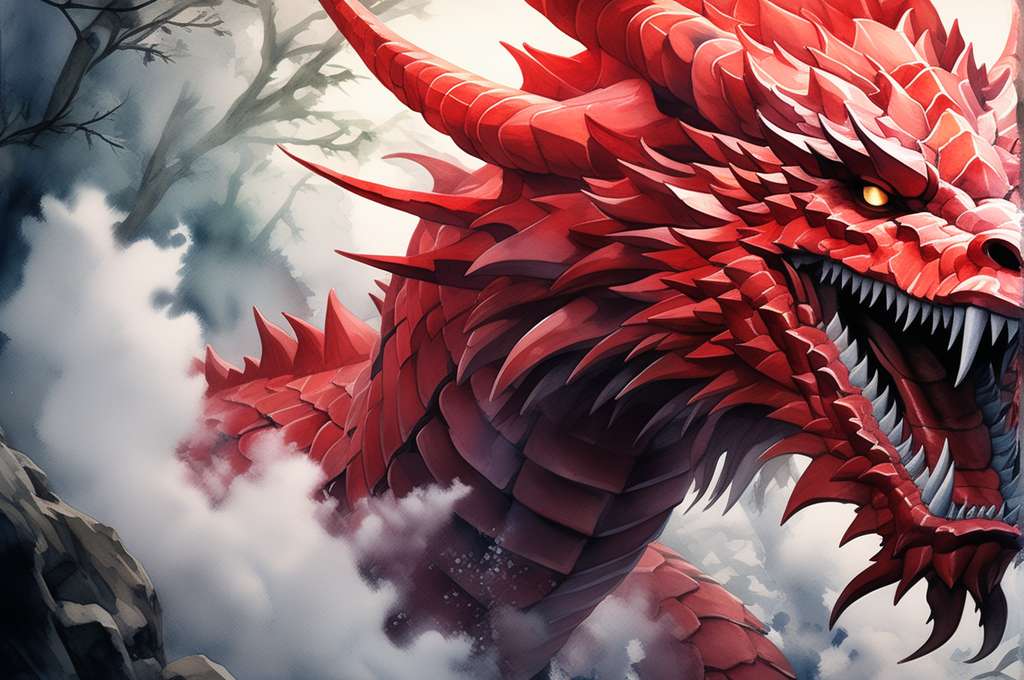
In Chinese culture, the dragon is far more than just a fearsome creature. It’s a complex symbol overflowing with spiritual meaning, representing a range of positive and powerful attributes.
1. Yang Energy and Power:
In Chinese philosophy, the dragon embodies the yang principle, symbolizing potent masculine energy. This translates to strength, dynamism, ambition, and the ability to overcome challenges. It’s a sign of leadership, authority, and the creative force that drives change and progress.
2. Cosmic Balance and Harmony:
The dragon is often intertwined with the yin-yang concept, representing the balance between opposing forces. Its serpentine form and association with water symbolize yin, while its fiery breath and connection to the celestial realm embody yang. This interplay signifies the essential harmony within the universe and the importance of embracing both sides of one’s nature.
3. Wisdom and Longevity:
Chinese dragons are traditionally depicted as wise, benevolent creatures. Their long lifespan, winding form, and association with water represent ancient wisdom, accumulated knowledge, and the flowing nature of time. They serve as guides and protectors, offering insights and fostering longevity in both physical and spiritual realms.
4. Prosperity and Good Fortune:
Dragons are deeply linked to luck and prosperity in Chinese culture. Their presence is believed to bring abundance, success, and positive energy. They are often featured in art, architecture, and festivals as auspicious symbols to attract wealth and favor.
5. Transformation and Change:
The ability of dragons to fly and soar through the heavens signifies their inherent connection to transformation and change. They represent the ability to adapt, evolve, and embrace new horizons. This can be seen as a spiritual reminder to stay adaptable, embrace challenges, and continually seek personal growth.
6. Hidden Potential and Inner Power:
In some interpretations, the dragon’s image signifies the vast, untapped potential within each individual. Its hidden treasures and mystical power symbolize the hidden strengths and wisdom lying dormant within us, waiting to be awakened and embraced.
Dragon spiritual meanings and symbolism in other cultures
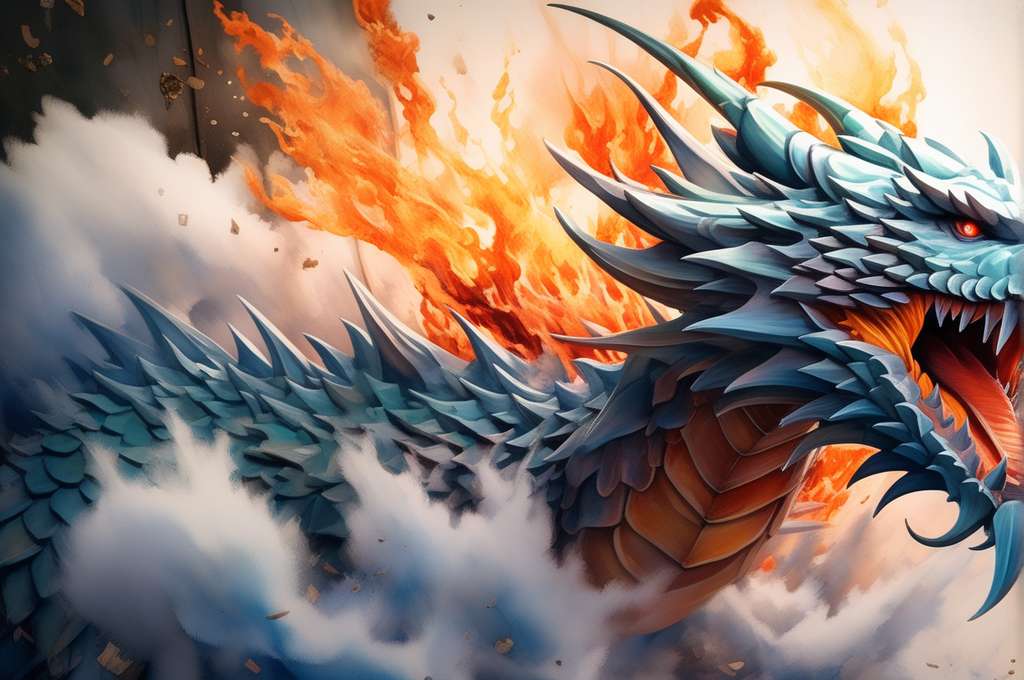
| Culture/Country | Spiritual Meaning of Dragons |
|---|---|
| European | Symbols of power and protectors of treasures. Sometimes depicted as adversaries to heroic figures in folklore. |
| Greek | Represent chaos, act as guardians and wise beings. Associated with protecting sacred spaces in mythology. |
| Norse | Symbolize strength, ferocity, and protection. Portrayed as both adversaries and allies of the gods. |
| Celtic | Associated with wisdom, power, and the supernatural. Often depicted as guardians or guides in art and stories. |
| Japanese | Embody strength, wisdom, and benevolence. Represent natural forces like water and weather in Japanese culture. |
| Korean | Associated with water, control weather, and natural elements. Considered powerful and sacred beings. |
| Hindu | Symbolize transformation, wisdom, and protection. Often depicted as divine creatures in Hindu mythology. |
| Egyptian | Seen as creators and destroyers, associated with primal chaos and life-death cycles in ancient Egyptian beliefs. |
| Persian | Considered wise, powerful beings, sometimes depicted as benevolent guardians in Persian mythology. |
| Slavic | Regarded as protectors and bringers of luck. Often depicted in folklore as creatures needing appeasement or defeat. |
What is the meaning of the dragon tattoo?

A dragon tattoo, etched onto your skin, isn’t just ink and needlework; it’s a declaration, a whisper to the universe, and a map to your inner landscape.
Eastern dragons, serpentine and wise, whisper of power, wisdom, and transformation. They are celestial guardians, bringing rain and prosperity. Each scale tells a story: longevity, etched in their long bodies; adaptability, hinted at in their graceful flight; and balance, woven into their union of yang fire and yin water.
This dragon whispers encouragement, urging you to face challenges with your head held high, embrace knowledge with an open heart, and flow with the ever-changing currents of life.
Western dragons, fierce and fire-breathing, speak of untamed potential and the shadows within. Their fiery breath mirrors the raw power surging within you, the passions that can both illuminate and devour. Their guarding of treasure speaks to your deepest desires, urging you to confront greed and possessiveness, lest they become your jailers.
This dragon is a cautionary tale, a reminder to harness your wildness wisely, confront your fears, and emerge from the darkness more whole.
Dragon dream spiritual interpretations
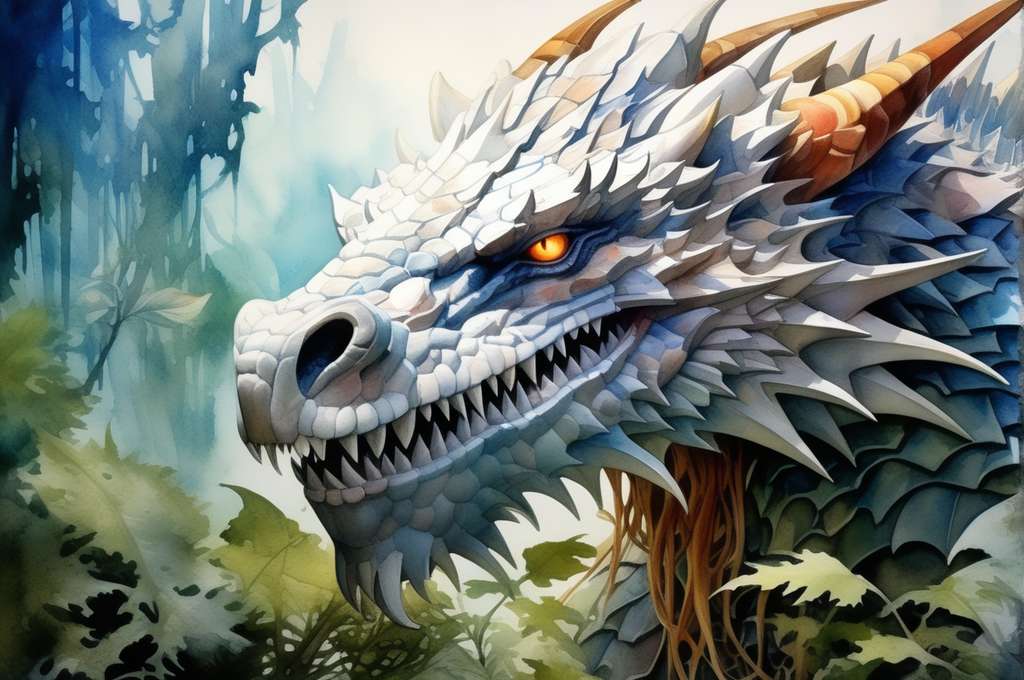
Dreaming of a dragon can be a powerful and transformative experience, its meaning as vast and fiery as its breath. In the realm of the subconscious, these mythical creatures weave tales of inner power, hidden potential, and spiritual growth, but can also whisper warnings of unfaced fears and untamed forces.
1) Confronting Your Shadow:
Often, dragons symbolize the shadow self, the aspects of ourselves we deem unacceptable and repress. These dreams can be invitations to delve into our darkness, face our deepest fears, and integrate them into a whole self. Battling or befriending the dragon becomes a metaphor for confronting difficult emotions, acknowledging unconscious desires, and ultimately finding self-acceptance.
2) Awakening Inner Power:
The dragon’s immense power can also represent our untapped potential. Dreams featuring these creatures might be nudges to tap into our innate strength, courage, and wisdom. Slaying a dragon may not mean literal violence, but conquering self-doubt, unleashing creative abilities, or overcoming personal limitations.
3) Transformation and Change:
Like the serpentine creature shedding its skin, dragons signify transformation and adaptation. Dreaming of them could be a sign that you’re on the cusp of a significant change, a personal metamorphosis, or a new chapter in your journey. The fire of the dragon may represent the burning away of the old to make way for the new, a reminder to embrace change and flow with life’s currents.
4) Spiritual Guidance and Protection:
In some cultures, dragons act as guardians and spirit guides. Their presence in dreams could symbolize protection, offering wisdom and strength during challenging times. They may be messages to trust your intuition, follow your inner compass, and let go of anxieties, knowing that powerful forces are watching over you.
5) Beware the Untamed Flame:
However, dragon dreams can also carry warnings. Their fire can symbolize unprocessed anger, uncontrolled desires, or destructive tendencies. If the dragon evokes fear or negativity, it might be a call to examine your emotional state, address buried anger, or learn to harness your fiery energy positively.
How to connect with your dragon spirit animal?
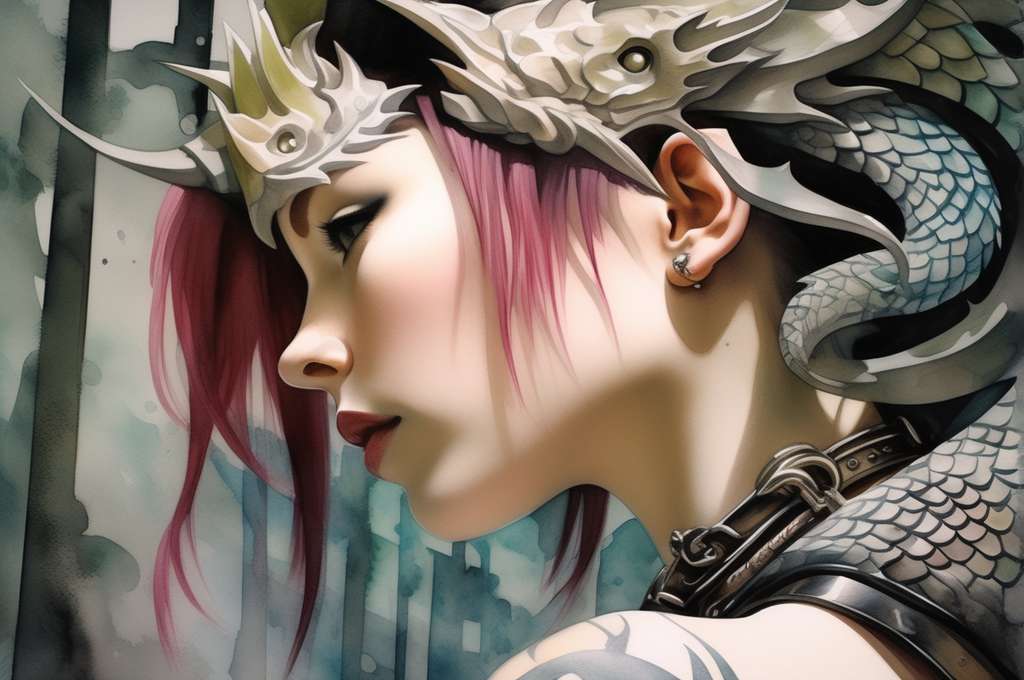
If you feel a deep resonance with the dragon spirit animal, connecting with its energy can be a powerful and enriching experience. Here are some ways to deepen your bond:
1. Explore Dragon Symbolism:
Immerse yourself in the rich symbolism of dragons across cultures. Read myths and legends, study their meanings in different traditions, and contemplate how they resonate with your own life experiences. This will help you understand the qualities and lessons your dragon spirit animal embodies.
2. Meditation and Visualization:
Create a calm and sacred space for meditation. Visualize yourself in a landscape that resonates with your dragon spirit animal – perhaps a mountain peak, a deep cave, or a flowing river. See your dragon appear, observe its form, color, and energy. Ask for guidance, clarity, or assistance in a specific area of your life. Pay attention to any messages, images, or emotions that arise during your meditation.
3. Creative Expression:
Channel your connection with the dragon through creative pursuits. Write stories, poems, or songs about dragons. Draw, paint, or sculpt your vision of your dragon spirit animal. Engage in movement practices that embody the dragon’s energy, such as tai chi or qigong. Creativity allows you to explore your connection on a deeper level and receive insights from your dragon guide.
4. Nature Connection:
Dragons are often associated with natural elements like fire, water, earth, and air. Spend time in nature, particularly in places that resonate with these elements. Go on hikes, swim in rivers, sit by firelight, or simply breathe deeply in the open air. Feeling connected to the natural world strengthens your connection to your dragon spirit animal, as they are guardians of these elements.
5. Dreamwork:
Pay attention to your dreams, especially any that feature dragons. Journal your dreams and record any details that stand out – the dragon’s appearance, your emotions, and the surrounding environment. Analyzing your dragon dreams can offer valuable insights into your spiritual connection and the guidance your dragon spirit animal is offering.
6. Respect and Gratitude:
Remember that your dragon spirit animal is a powerful companion and guide. Treat your connection with respect and gratitude. Offer thanks for their presence in your life and any guidance you receive. This strengthens the bond and encourages further communication and support.
Final words
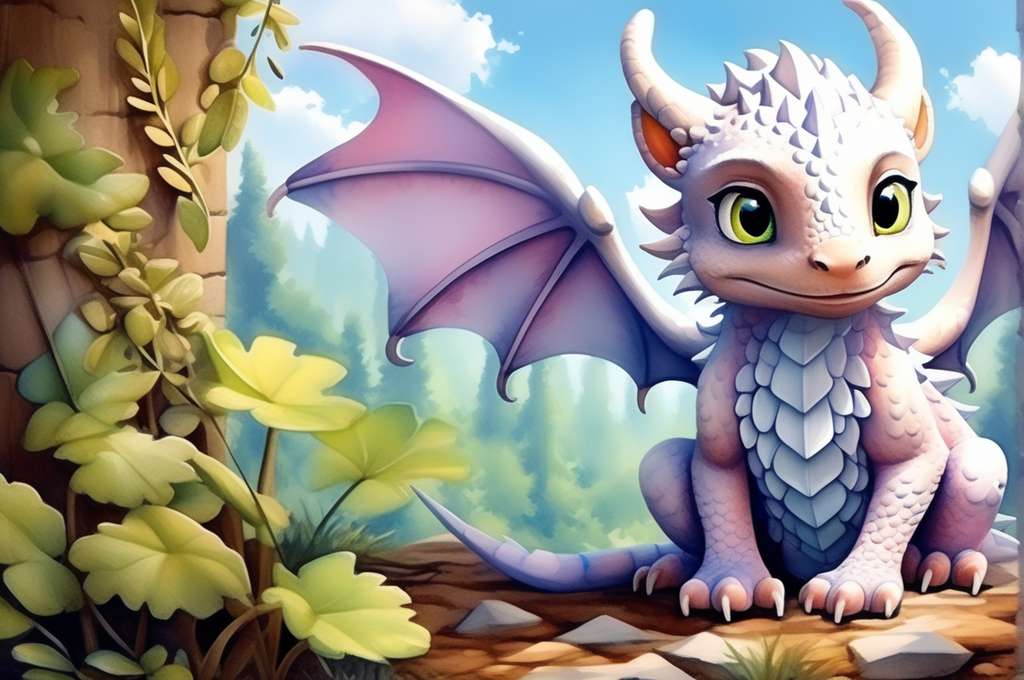
In conclusion, dragons hold a rich and diverse range of spiritual meanings across various cultures. These majestic creatures symbolize power, strength, wisdom, and protection, representing the pursuit of enlightenment and the ability to overcome challenges.
They also serve as guardians of hidden knowledge and wisdom, bridging the gap between the material and spiritual worlds.
Embracing the dragon spirit animal can help you harness its energy to navigate life’s challenges with courage and grace, reminding you of your inner resilience and capability to overcome obstacles.
By understanding the symbolism of dragons in dreams and mythology, you can better appreciate their profound impact on your personal and spiritual growth, and use their power to inspire and guide your journey.
You Might Also Like
1) Dragonfly Spiritual Meanings & Symbolism: Different Colors
2) Dog Crying or Barking at Night Spiritual Meaning
3) Spiritual Meaning of a Raccoon in Your Path: Day, Night, Cross
4) Owl Hooting Outside My Window Meaning Spiritual



